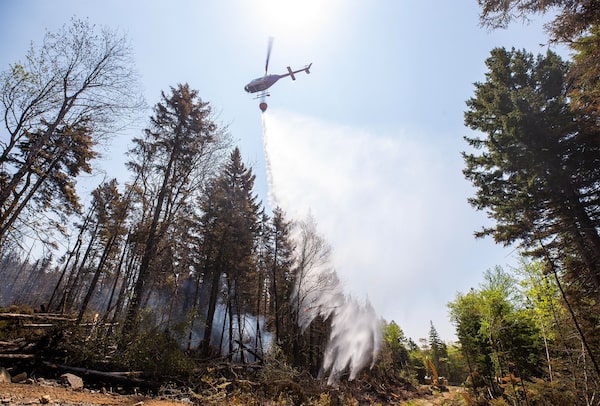
This image, courtesy of the Nova Scotia Government, shows a helicopter dropping water on a hotspot behind Yankeetown Road as excavator makes a fire break in the Tantallon wildfire on June 1, 2023.HANDOUT/AFP/Getty Images
After last year’s record-breaking wildfires across Canada, preparations have begun in the hopes of mitigating the strain on military resources.
Provincial governments have reported active wildfires that started this year. Seven fires are active in Alberta and two are burning in British Columbia. These numbers do not include carryover fires from last year. Provincial data states that all wildfires in Alberta and British Columbia are not projected to grow past expected boundaries or remain under control.
Aimee Harper, a spokesperson from the Ministry of Emergency Management and Climate Readiness in British Columbia, wrote in an e-mail that the government is preparing to “take every action necessary” to protect its citizens.
“We are doing everything we can to plan for this season and strongly encourage people and families to also start thinking about preparing for this upcoming season,” Ms. Harper wrote.
The early wildfire season could signal looming demands on Canadian Armed Forces personnel and resources.
The Forces have doubled their responses to requests for federal assistance approximately every five years since 2010, government data show.
A review of domestic military operations related to disaster relief was presented to the standing committee on national defence in November. It shows that the Forces responded to eight requests for federal assistance in 2023. Between 2017 and 2021, they responded to an average of four requests per year, and the average was just two requests per year between 2010 and 2016.
In 2023, more than 2,060 Armed Forces personnel were deployed in response to requests. Quebec received the most, followed by Alberta and British Columbia. The majority of requests for federal assistance were submitted in relation to wildfires.
While the requests for the Armed Forces’ presence in response to disasters are growing, recruitment for the Forces is trending down.
Chief of Defence Staff General Wayne Eyre told the committee on national defence in 2023 that the military was short more than 16,000 personnel. In the 2021-22 fiscal year, a little more than 8,000 people joined the Regular Force and Primary Reserve. The next fiscal year, intake dropped to about 7,100.
Alex Tétreault, a spokesperson for the Department of National Defence, said the federal government has made investments to bolster wildfire responses. These measures include an initiative that invests $285-million over five years to increase resilience to wildland fires, an equipment fund that provides $265-million to provinces and territories, and a training program that aims to educate 1,000 additional firefighters on fire management.
Mr. Tétreault highlighted that the primary response to natural disasters rests with local governments and non-military emergency-response teams.
“While CAF members are highly trained and stand ready to offer assistance in support of civilian authorities during any crisis in Canada, including natural disasters, they remain the force of last resort for domestic, climate-related emergencies,” Mr. Tétreault said.
Ms. Harper said British Columbia’s government has taken a number of actions in advance of wildfire season, including measures to strengthen the BC Wildfire Service and enhance wildland-firefighter recruitment, secure more equipment, deploy new technologies and step up prevention work.
“While we don’t know for sure what this spring and summer will look like, we have a plan, we are getting prepared, and we’ll get through it together,” Ms. Harper wrote.
Defence Minister Bill Blair said in a committee meeting last fall that he expects demand for Armed Forces’ assistance to continue to increase.
“We already have an extraordinary group of Canadians who fight wildfires, volunteer firefighters, professional firefighters and municipal firefighters all across the country,” Mr. Blair said, “but we have seen on occasion … we needed to provide them with additional support.”